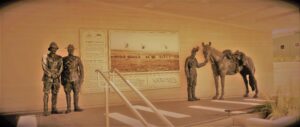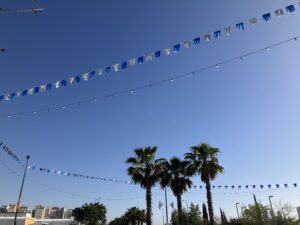They say that misery loves company. What if when you suffered, you knew that someone else was suffering alongside you? That would be comforting, wouldn’t it?
When we as Jews think of Messiah son of David, we think about King David – a strong king we love to remember for winning wars. As such, we picture the Messiah as someone who will one day come, followed by a large army, in order to conquer and reign as king over His creation.
While this is all true, when we look at King David’s writings about the Messiah in Psalm 22, we find his most famous description of the Messiah focuses on the exact opposite of a strong, conquering Messiah. Rather, we come across a lowly Messiah, tortured and forsaken by God.
Yes, He died for our sins. But why would any of us want to follow such a messiah?
The answer, as we will see, is that we have a Messiah with whose pain we can identify, and He can also identify with our pain when we suffer.
Psalm 22 is much more than a prophecy about how to recognize the Messiah when He comes.
It is a psalm of agony that we can all relate to. It speaks to our hearts deeply.
Think about the sacrifices that Israel offered up for their sin. Think about the innocent animal that nobody cared about – how it was dragged to his slaughter and had its throat cut. Imagine that lamb could write and describe its feelings. Psalm 22 describes the agony and pain of that lamb, only this is a very special lamb – the Lamb of God.
Most believers I know have felt a bit like that lamb at some point in their life – praying to God but feeling forsaken by Him and everybody else. Yet there are times, within these very trials, where we can feel a great sense of confidence and comfort in the Lord.
We can be comforted more easily as human beings because we have a Messiah to whom we can relate. Not many of us are kings, so perhaps we may relate so readily to the Messiah as king, but we all go through rejection, pain and suffering, just as he did. We all sometimes feel forgotten about and forsaken even by those closest to us – an experience that the Messiah himself understands well.
Psalm 22 is probably the most famous prophetic psalm about the Messiah!
Much like Zechariah 12, Daniel 9 and Isaiah 53, it describes the Messiah experiencing torment, rejection and loneliness.
Like Joseph, King David also serves as a “prototype” of the Messiah. Therefore, many refer to the Messiah as the “Son of David.” King David, who wrote Psalm 22 by the inspiration of the Holy Spirit, predicted that the Messiah, who will be his descendant, will suffer, be rejected and die.
Matthew 27 verse 46 says that when Jesus was on the cross, He referred us to Psalm 22 in His cry:
“Eli, Eli, lema sabachthani?” That is: “My God, my God, why have you forsaken me?” (Matthew 27:46)
Verse 1 of Psalm 22 reads,
“My God, my God, why have you forsaken me?
Why are you so far from saving me, so far from my cries of anguish?”
While God and the Messiah are “connected” to one another, this psalm foretells how God had to separate from the Messiah. God turned His face away from the Messiah so that, as He dies, He may take the sins of Israel and of all mankind upon Himself.
Verse 2:
“My God, I cry out by day, but you do not answer, by night, but I find no rest.”
God doesn’t save the Messiah but rather remains silent in the face of the injustice, the suffering and the torture that He is forced to endure.
It is one thing to call for help during the day, as you can cover your pain by keeping busy. However, when night comes, when everything stops and becomes silent, we meet with our deepest thoughts. We can no longer keep ourselves busy to forget our pain. The dark of night makes loneliness feel very isolating. The hills of Judea are very dark at night, even today.
Verse 3-5:
“Yet you are enthroned as the Holy One;
you are the one Israel praises.
In you our ancestors put their trust;
they trusted and you delivered them.
To you they cried out and were saved;
in you they trusted and were not put to shame.”
These verses remind us that God had already saved our forefathers, who cried to Him. This means that He IS capable of saving, yet chose not to save the Messiah. He has a special reason for doing this.
What is interesting is that, in contrast to many people today, the psalmist is not saying, “Oh, life is so hard, God is not helping me, therefore He does not exist. That’s it! I’m done with God! I’m an atheist!” No, even in the depths of his pain, he still recognizes God as the Holy One. He reminds himself of what God has done in the past and finds refuge in that. When it is difficult for us, when we feel alone, we too can look back at the things God has done in our lives in the past.
Verses 6-8:
“But I am a worm and not a man,
scorned by everyone, despised by the people.
All who see me mock me;
they hurl insults, shaking their heads.
“He trusts in the Lord,” they say,
“let the Lord rescue him.
Let him deliver him, since he delights in him.”
Using similar terms as those found in Isaiah 53, these verses describe the scorn and mockery toward the Messiah by all around Him, who merely saw Him as something harmful they must get rid of. Just like a worm that needs to be crushed. They did not even consider Him a man, but an insect. His own people humiliated Him and were ashamed of Him – “You came here to bring salvation? Look, you cannot even save yourself!” They did not understand His mission. It is the same with us; how many times do we feel misunderstood by others?
Do you remember the story about Joseph?
His brothers did not understand him. They mocked him, hated him, tried to get rid of him and tossed him in a pit. Joseph was rejected by his own people and delivered into the hands of Gentiles. He was presumed dead and forgotten as though he were irrelevant. Meanwhile, Joseph was welcomed among the Gentiles and became a great and important leader as he performed wonders and miracles among them. The story ends well, when Joseph is EVENTUALLY welcomed back into his own people as well.
In the same way, Jesus, who was humiliated and rejected by our people Israel, was delivered to the Romans and left for dead. Meanwhile, among the Gentiles, Yeshua was welcomed and became a great and important leader. One day Yeshua too will be welcomed back by our people!
Verses 9-11:
“Yet you brought me out of the womb;
you made me trust in you, even at my mother’s breast.
From birth I was cast on you;
from my mother’s womb you have been my God.
Do not be far from me,
for trouble is near
and there is no one to help.”
“Yet you brought me out of the womb” – the very reason I’m even alive is because of You. In other words, my life does not belong to me, it belongs to You. And it is Your right, God, to take it back whenever You wish.
While we place our trust in people, the Messiah’s trust is not in people, but in God. He has put His faith in God from the very beginning. However, God is not there in His time of trouble.
God forsakes the Messiah. He must.
Interestingly, in this passage, as in the rest of the biblical prophecies about the Messiah, only the Messiah’s mother is mentioned, there is no human father.
Verses 12-15
“Many bulls surround me;
strong bulls of Bashan encircle me.
Roaring lions that tear their prey
open their mouths wide against me.
I am poured out like water,
and all my bones are out of joint.
My heart has turned to wax;
it has melted within me.
My mouth is dried up like a potsherd,
and my tongue sticks to the roof of my mouth;
you lay me in the dust of death.”
Bashan was well known at the time for having the strongest, scariest bulls. The psalmist describes the Messiah as being surrounded and humiliated in the dust of death. As if they run around him, there is no way out. Only death. The Messiah’s persecution has come to its peak. It is described as roaring lions threatening to tear Him to pieces. He experiences intense sweating. He feels as if His bones are falling apart, out of fear. His heart melts within His body. He is dried up and has no strength, so much so, that His tongue sticks to His cheek. God brings Him before the judgment of cruel and evil people: And God does not intervene, He does not stop the proceedings. God looks from above, and allows it. By forsaking Him, God basically lays Him in the dust of death.
Verse 16:
“Dogs surround me,
a pack of villains encircles me;
they pierce my hands and my feet.”
Verse 16 bears a remarkable resemblance to the one in Zechariah 12, verse 10: “When they look on me, on Him whom they have pierced”, as well as the description in Isaiah where the Messiah is said to be “pierced for our transgressions” (Isaiah 53:5).
Take a look at this rabbinic Midrash written 1200 years ago, prior to the Masoretic text:
“During the seven year period preceding the coming of the son of David, Iron beams will be brought low and loaded upon His neck until the Messiah’s body is bent low. Then He will cry and weep, and His voice will rise to the very height of heaven, and He will say to God:
“Master of the universe, how much can my strength endure? How much can my spirit endure? How much my breath before it ceases? How much can my limbs suffer? Am I not flesh and blood?”
…During the ordeal of the son of David the Holy One, blessed be He, will say to him:
“My true Messiah, Long ago, ever since the six days of creation, you did take this ordeal upon thyself. At this moment, thy pain is like my pain.”
At these words, the Messiah will reply: ‘Master of the Universe, now I am reconciled. The servant is content to be like his Master.’”
(Midrash Pesikta Rabbati, 36:2)
Jesus endured rejection, agony, humiliation and death. And just as King David stood alone before Goliath and fought him for the sake of the people of Israel, Jesus stood alone before death, in order to represent us: the people of Israel, and all mankind. And unlike David, Jesus did not merely risk His own life for His people, but GAVE His life – for all of us!
Yes, there was pain. Yes, there was torment. Yes, for a while Yeshua was forsaken. But our God is an expert in bringing sweetness out of the worst situations – in this case, salvation to the world!
As followers of a Messiah who suffered much pain, we can be comforted that as we go through suffering, as we feel forsaken, we too can know that God will bring the best out of any situation. There is always hope, and there is always a future!
















